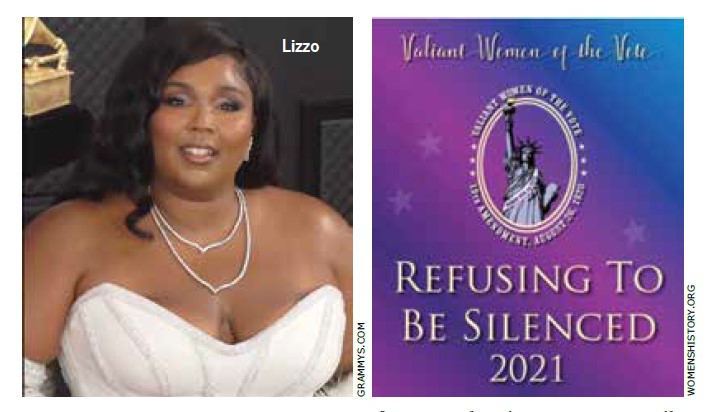
By Andrea Shorter–
Remember the glorious days and times of Lizzo? It all seems so way back now—the pre-pandemic days when Lizzo was unapologetically taking over the world as the “Good as Hell” positively queer, queer positive, body positive, trained flutist turned mega-hip hop star flaunting her juice and getting loose to the luscious bouncy beats of her own drum. With her growing legions of Lizzbians, Lizzo was emerging as the moment’s popular and sometimes controversial glam cover girl anthem of new female empowerment, a young Black woman who against all odds became wildly, award winning, game changing successful in her field of dreams. It was all so terrific.
Then, in the real world, all hell broke loose.
In the few years before the onset of the COVID-19 pandemic, there were certainly many points heralding women’s political empowerment. The ever-regressive Trump years inspired record scores of women to run for state and local offices, Congress, and U.S. president. The import of the voting power of Black women in the Democratic Party was being finally recognized and taken seriously beyond an amusing novelty, and proved the saving grace for not only a fading presidential primary candidate and eventual voter record shattering landslide winner in Joe Biden, but also for other key races in the South to tip the balance of Democratic majority power, particularly in the Senate.
Stacey Abrams’ stellar strategic organization to aggressively push back against voter suppression and mobilize coalitions of Black voters as well as young, white, college-educated voters and others will be the model franchise for years to come. The election of the first woman, who is also a woman of color, as vice president became the paramount milestone of the century-long quest to elect a woman into the Executive Branch.
Of course, there is much more to the strides, setbacks, and accolades celebrating progressive women’s political empowerment during the Trump years than can be fully explored here. Still, as getting good as hell gains were being made on U.S. political and electoral fronts, the impacts of the COVID-19 pandemic on the status of women are proving hellishly severe.
Prior to COVID-19, the global economic status of women was already dire, particularly for poor and marginalized women, which includes transgender women. According to UN Women, economic crises such as presented by this pandemic hit women particularly hard because women tend to earn less, have fewer savings, are disproportionately more in the informal economies, have less access to social protections, are more likely to be burdened with unpaid care and domestic work (and therefore often have to drop out of the labor force), and make up the majority of single-parent households.

UN Women further advises that “while everyone is facing unprecedented challenges, women are bearing the brunt of the economic and social fallout of COVID-19. Women who are poor and marginalized face an even higher risk of COVID-19 transmission and fatalities, loss of livelihood, and increased violence. Globally, 70 percent of health workers and first responders are women, and yet, they are not at par with their male counterparts. At 28 percent, the gender pay gap in the health sector is higher than the overall gender pay gap (16 percent).”
The ongoing political gains being made by women could prove more crucial to closing the gender gap and enabling economic and social recoveries once the COVID-19 pandemic ends. The consequences and impacts of the pandemic on women, however, are forecast to outlast for generations the actual pandemic itself. As shortsighted partisan political games over an extensive, comprehensive American COVID-19 recovery—including a long overdue push to raise the federal minimum wage standard—carry on, now is the time to plan and start acting for long-term recovery efforts that will directly impact particularly vulnerable women and girls such as with direct income support, bridged gender pay gaps, support for women-owned businesses, and support for women workers.
A post-pandemic recovery will not lead to long-term gains if it re-establishes norms that engendered gender-based inequities, impoverishment, and exposure to violence. How we respond seriously to the burgeoning global and national economic and social economic burdening women is essential and central to any manner of post-pandemic recovery. There is no “good as hell” for any of us without improving the status of women as a primary directive.
As is the case during any Women’s History Month, there are thousands of women—heroic, courageous, trailblazing, innovative, creative, surviving women—who will and should be spotlighted and celebrated in our communities, and across the nation. I look forward to sharing in those celebrations as this March progresses. All the while, I will continue to enjoy what I can of my cool millennial queer people’s playlist as a budding Lizzbian. Bless you, Lizzo. No matter how great the challenges ahead, your beats make this Lesbian/Lizzbian feel as good as hell.
Andrea Shorter is a Commissioner and the former President of the historic San Francisco Commission on the Status of Women. She is a longtime advocate for criminal and juvenile justice reform, voter rights and marriage equality. A Co-Founder of the Bayard Rustin LGBT Coalition, she was a 2009 David Bohnett LGBT Leadership Fellow at the Harvard Kennedy School of Government.
Published on March 11, 2021
Recent Comments